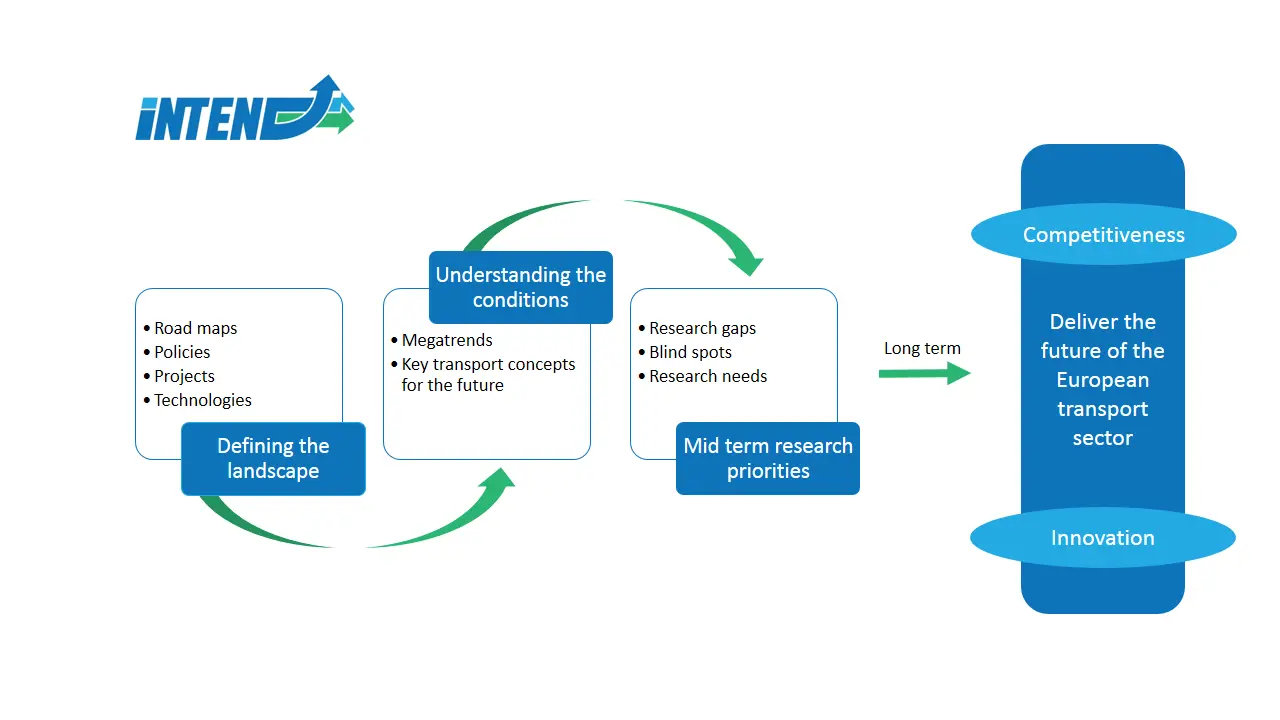Intentify future transport research needs (INTEND)
In this one-year research project, an overview of research gaps in the European transport sector will be elaborated. This will enable research funds to be used more effectively and efficiently in the future, to strengthen the competitiveness of the European transport sector in the long term. This project is funded by the European Union as a part of the Horizon 2020 research programme.

Initial situation and objectives
Current national climate commitments will not be sufficient to keep global warming below the two-degree target set for the coming years. Furthermore, the transport sector has seen a steady increase in CO2 emissions over the years compared to other industries. This underscores the importance of a system shift towards more sustainable and intelligent transport systems in the future. The European Union is therefore promoting research into innovative technologies in order to further reduce Europe's dependence on oil. In addition, the aim is to keep Europe as a location for innovation and thus remain competitive in the long term.
Therefore, the INTEND project aims to provide an overview of research gaps in the European transport sector. The end product will be a research agenda with guidelines to guide decision makers from politics, industry and science towards an innovative and competitive European transport sector. An international research consortium consisting of representatives of Coventry University Enterprises Limited (CUE), the Centre for Research and Technology Hellas / Hellenic Institute of Transport (CERTH/HIT), the University of Belgrade, Faculty of Transport and Traffic Engineering (FTTE), the Technische Universität Berlin (TUB) and the Zurich University of Applied Sciences / Institute for Sustainable Development (ZHAW/INE) is working on this one-year research project.
Project Schedule

- In a first phase of the project, a systematic analysis process will be used to collect all mobility-relevant studies (with a time horizon of 2020-2035) and to examine relevant findings regarding technological progress in the different modes of transport.
- In a second phase, the relations between future trends and their drivers are characterized in an analytic network process. An online survey with experts from the transport sector examines further the impact of various policies and megatrends on the transport system.
- In a final phase of the project, the synthesis of the results from the preceding work steps takes place. The end product is a research agenda to identify research gaps, needs and priorities in the European transport sector. This agenda will not exclusively focus on the transport sector. In order to overcome path dependencies and trigger new (innovative) ideas beyond mainstream research, this agenda consciously takes an external perspective and thus intends to strengthen the innovative capability and the competitiveness of the European transport sector in the long term.
Publications
The final reports, in which the INE was in charge, can be downloaded directly from the following links:
D4.1 Sketch of the future transport system
D4.3 Transport research agenda
All other publications (final reports, papers and presentations) from the INTEND project can be viewed and downloaded from the following link:
At a glance
Participating Institutes ZHAW:
Project partners:
- Coventry University Enterprises Limited (CUE)
- Centre for Research & Technology Hellas / Hellenic Institute of Transport (CERTH/HIT)
- University of Belgrade, Faculty of Transport and Traffic Engineering (FTTE)
- Technische Universität Berlin (TUB)
Project Manager ZHAW:
- Dr. Merja Hoppe
Team:
- Thomas Trachsel
Project financing: European Commission (Horizon 2020)
Project status: finished